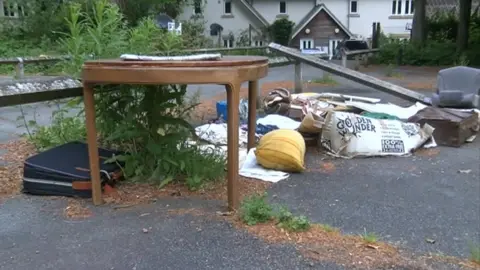Wales fly-tipping fixed penalty move to be approved
 BBC
BBCPeople who give their waste to someone "in good faith" who then fly-tips it could face a £300 fixed penalty notice.
On Tuesday assembly members approved new rules making it easier for councils to take action against householders who hand their waste to people not authorised to handle it.
UKIP, the only party to oppose the move, called it a "stealth tax".
Councils saw more than 35,000 incidents of fly-tipping in just one year.
They cost Welsh taxpayers £2m in clean-up costs in 2017-18, figures showed.
Currently, householders can be issued with a fixed penalty notice if they fly-tip their domestic waste themselves.
A Welsh Government report said more than 60% of fly-tipping incidents originate from domestic properties - often the householder did not fly-tip themselves but did not carry out the appropriate checks to meet their duty of care, and allowed an unauthorised person to take it away.

Councils can prosecute householders who give their waste to an unauthorised person, but prosecutions can cost an average of £200 to £400 a time.
The report said these prosecutions were often deemed inappropriate and would leave the householder with a criminal record, despite paying for the waste to be disposed of in good faith with "no idea" it would be fly-tipped.
Under plans that were put before the Senedd for approval on Tuesday, a fixed penalty of £300 - reduced to £150 if paid early - could be given to households that breach their "waste duty of care".
Councils will be able to keep the money from the fixed penalty notices (FPNs) to put towards enforcement and clear-up costs.
Receipts from FPNs issued by Natural Resources Wales will be paid to Welsh ministers.
A total of 41 AMs voted for the new regulations, with two opposing them.
A spokesman for UKIP, which objected to the rules, said: "It is effectively a stealth tax. This comes at a time when bin collections are being slashed, and it is becoming ever more difficult for people to recycle and dispose of waste, with recycling centres closing, and councils imposing charges for services which have previously been paid for by council taxes."

Questions to ask
- Ask for a receipt of what is taken away
- Ask for proof they have a carrier's licence
- Ask to have in writing where they intend to take the waste
Source: Rebecca Colley Jones, Chartered Institute of Waste Management
